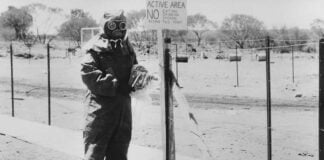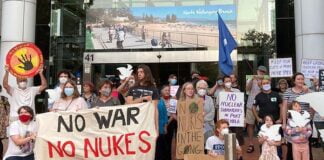by Jean Parker
IF WE needed any proof of the depth of anti-Bush sentiment in the US, from Iraq to health insurance, we need look no further than the Democratic primaries. Hilary Clinton and Barak Obama continue to run the closest race for the Democratic presidential candidate in recent history.
Yet the most remarkable thing about this battle is the degree to which it is increasingly pulled to the left by the wholesale rejection of Bush.
The US occupation of Iraq, now costed at over $3 trillion by Nobel Prize winning economist Joseph Stiglitz, has created a backlash that has pulled the Democratic front-runners into a competition to harness this anti-war sentiment to get them over the line.
But the chasm between the actual policies of the leading candidates and the hopes of ordinary Democrat supporters will prove the real legacy of the 2008 presidential election.
Barak Obama’s meteoric rise, which still sees him ahead of Hillary Clinton’s delegate count even after her wins in Ohio and Texas, clearly embodies the shift to the left.
Obama’s success has been based on mobilizing record numbers of rank and file campaigners. He received donations from more than 100,000 people, far surpassing that of any other candidate (double Clinton’s).
In an extraordinary sign of his success at mobilizing ordinary people, 90 per cent of his donations were made up of small donations of $100 or less.
In a short TV advertisement that aired during the Superbowl, amid pictures from Iraq and Hurricane Katrina, Obama’s voiceover says:
“We want an end to this war and we want diplomacy and peace. Not only can we save the environment, we can create jobs and opportunity. We’re tired of fear; we’re tired of division. We want something new. We want to turn the page. The world as it is is not the world as it has to be.”
As the primaries have gone on Clinton too has tacked left. This is no easy task with the baggage of her husband’s presidency, her political pedigree and her Senate vote for the invasion of Iraq in 2002 hanging around her neck.
Clinton is vulnerable to Obama’s assertions that she wants to change the “driver” that took the US into the quagmire of Iraq, but not the “car”, much less the “road” to war.
President George W. Bush endorsed Republican presidential candidate Senator John McCain. “He’s not going to change when it comes to taking on the enemy,” Bush said.
McCain wants to carry on the “war on terror”, but disassociate himself with Bush’s Presidency. McCain has opposed the use of “water-boarding”-the torture technique of drowning and reviving “terrorist suspects”, which Bush describes as a necessary tool of intelligence gathering.
But he has also been quoted as saying the US must stay in Iraq for a hundred years, and supports an attack on Iran.
McCain’s personal popularity has risen in recent months, and the Democratic primaries will increasingly focus on who can beat McCain.
Clinton relies on throwing doubts onto Obama’s “security” credentials. In the long run this talk of security credentials will only strengthen McCain.
The substance-Obama’s
recipe for more war
The Democratic primaries have exposed a real hope for change amongst ordinary Americans. But behind the ads and speeches, the policies of both candidates show that they have more in common with each other and with Bush than they do with the volunteers who are flooding to assist with their campaigns.
Obama’s main international relations advisor is Zbigniew Brezezinski, who was national security adviser to President Carter.
In the 1970s Brezezinski orchestrated US arming of hardline Islamic groups (later known as the Taliban) which fought the pro-Soviet government in Afghanistan and led to the Russian invasion in 1979. He argues in his seminal book The Grand Chessboard that the US has to control Eurasia to maintain its superpower status.
Despite his claim to be the anti-war candidate, it is clear from Obama’s policies on the Middle East-and the credentials of his advisors-that in power he would continue US military domination of the region.
Iraq after “withdrawal”
Obama’s version of withdrawal from Iraq includes keeping the massive permanent US bases across that country. He speaks of creating an “over the horizon” force that can re-enter Iraq at any time and wants to keep the tens of thousands of US military trainers in place.
Jeremy Scahill, author of Blackwater, tallies the numbers of US troops which would remain in Iraq under Obama’s plan:
“At present, there’s 10,000 to 20,000 US trainers, all of whom will require security, so that’s a substantial force. When the Institute for Policy Studies did an analysis of what this would mean, they said it’s 20,000 to 60,000 troops, not including contractors. And right now we have a one-to-one ratio with contractors and troops in the country. 20,000 to 60,000 troops indefinitely in Iraq, this is something that over the course of ten years the Congressional Budget Office says could cost half-a-trillion dollars.
This doesn’t include the fact that you have to have troops bringing supplies in and out of Iraq. It doesn’t include the troops that Obama and Clinton are going to keep in Kuwait, Qatar, Jordan and elsewhere.”
Obama wants to increase the US military budget to pay for 90,000 new troops at a cost of $15 billion. He also wants to keep mercenary firms such as Blackwater, employed by the US government, to be an essential part of “security” for the occupation infrastructure in Iraq.
Afghanistan-a “good and proper war”
Obama’s “anti-war” sentiment in reference to Iraq is pitched to increase the US occupation of Afghanistan, where he wants to deploy another 7000 troops immediately:
“





